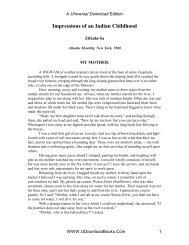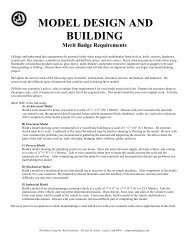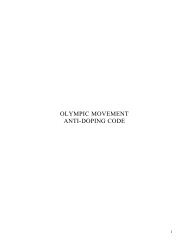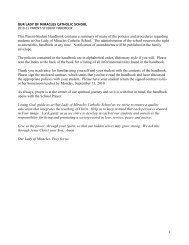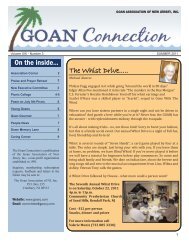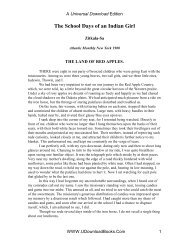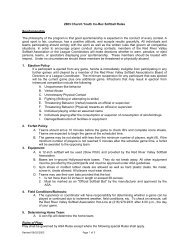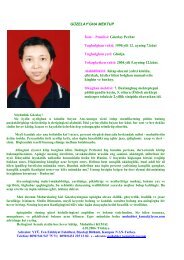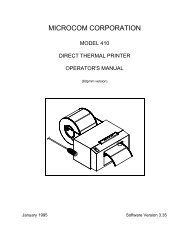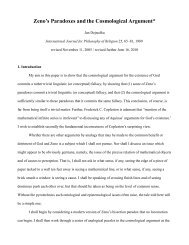Dummett's Backward Road to Frege and to Intuitionism - Tripod
Dummett's Backward Road to Frege and to Intuitionism - Tripod
Dummett's Backward Road to Frege and to Intuitionism - Tripod
Create successful ePaper yourself
Turn your PDF publications into a flip-book with our unique Google optimized e-Paper software.
each other, sense-mapping is just what we should expect. The mapping of senses on<strong>to</strong> thoughts by<br />
incomplete senses innocuously models the mapping of references on<strong>to</strong> truth-conditions by incomplete<br />
references.<br />
Dummett criticizes Geach’s view that incomplete senses are unsaturated functions for<br />
destroying <strong>Frege</strong>’s major a<strong>to</strong>ms-<strong>and</strong>-molecules metaphor of how thoughts are composed of senses<br />
(1981a,:263–66). I face the criticism <strong>to</strong>o, since I find incomplete senses unsaturated in their own right. I<br />
think Dummett has it backwards. Saturation is a basic part of <strong>Frege</strong>’s a<strong>to</strong>ms-<strong>and</strong>-molecules metaphor.<br />
<strong>Frege</strong> studied chemistry. And when I described <strong>Frege</strong>’s functions <strong>and</strong> concepts <strong>to</strong> him, the chemist<br />
Stephen Richardson immediately identified the basis of the metaphor as chemical saturation. An<br />
unsaturate is an a<strong>to</strong>m having electron-spaces available for electrons from another a<strong>to</strong>m <strong>to</strong> fill, binding<br />
the two a<strong>to</strong>ms <strong>to</strong>gether in<strong>to</strong> a molecule. Thus the mapping is of electrons on<strong>to</strong> molecular compounds by<br />
unsaturates. Polyadic functions <strong>and</strong> incomplete senses are like polyunsaturates. The greater the number<br />
of binding completions needed <strong>to</strong> form the compound, the more unsaturated—<strong>and</strong> existentially<br />
unstable (volatile!)—the compound is. Thus <strong>Frege</strong> seems <strong>to</strong> be explicating the metaphysical bond of<br />
the unity of a thought as a valency bond. And valency bonds are just what bind a<strong>to</strong>ms in<strong>to</strong> molecular<br />
compounds. Now how could saturation, which is the basis of molecular theory, go against molecular<br />
theory? 26<br />
Dummett argues further that if senses are removed from thoughts <strong>to</strong> yield incomplete senses,<br />
then we must know thoughts first, <strong>and</strong> cannot learn new thoughts by “a<strong>to</strong>mically” compounding them<br />
out of senses (1981a: 267). If so, this is no special problem about senses, since by parity of reason we<br />
could not learn new truth-conditions by “a<strong>to</strong>mically” compounding them out of references either. And<br />
Dummett still has <strong>Frege</strong>’s saturation metaphor backwards. It is precisely through saturation that we<br />
compound chemicals out of a<strong>to</strong>ms. Dummett is confusing the order of cognition with the order of<br />
being. In the order of cognition, we can <strong>and</strong> generally do cognize new thoughts by compounding them<br />
44




